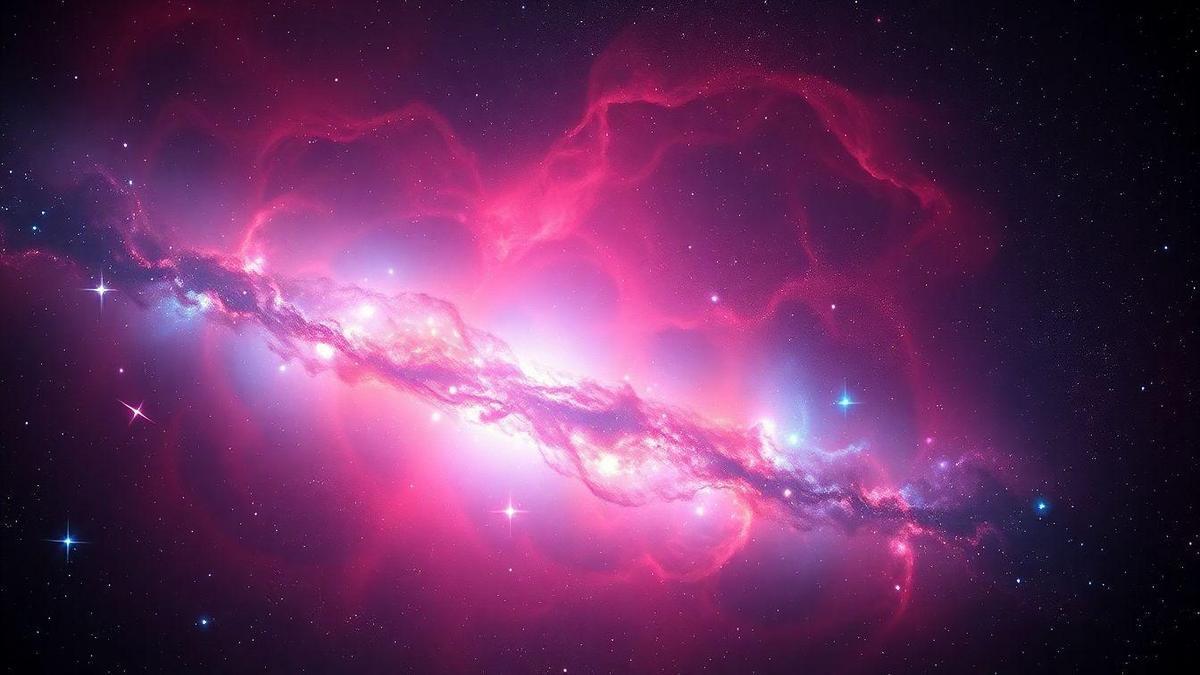
Dark energy is one of the most intriguing and mysterious components of the universe. Representing approximately 68% of the cosmos, its nature remains unknown to scientists. Dark energy is responsible for the accelerated expansion of the universe—a phenomenon discovered in the late 1990s through observations of distant supernovae. This discovery challenged conventional understanding of gravity and led astronomers to reconsider the composition of the universe.
Cosmic acceleration refers to the observation that the universe’s expansion is not slowing down but actually increasing over time. This acceleration suggests a repulsive force acting on cosmological scales, attributed to dark energy. Together, dark energy and cosmic acceleration pose one of the greatest challenges in modern cosmology, raising fundamental questions about the structure and evolution of the universe.
How Do Dark Energy and Cosmic Acceleration Work in the Universe?
Dark energy acts as a form of negative pressure that influences the universe on large scales. While gravity pulls matter together, dark energy appears to push space itself apart, causing galaxies to move away from each other at an ever-increasing speed. This dynamic is described by the equation of state for dark energy, which relates its pressure to its density. Although we do not yet fully understand its nature, several theories aim to explain how dark energy operates.
One of the most popular theories is the “cosmological constant,” proposed by Albert Einstein in his general theory of relativity. The cosmological constant suggests that there is a vacuum energy density that fills all of space. Initially dismissed by Einstein, this idea was revived after modern discoveries showed that the universe is expanding at an accelerating rate. The cosmological constant may be key to understanding dark energy and its role in cosmic acceleration.
Another approach is the theory of “modified gravity.” This theory proposes that gravity may behave differently on cosmic scales than it does locally. It implies that gravity is not a constant force throughout the universe but something that can vary in different regions and eras. This idea is appealing because it could explain cosmic acceleration without invoking an entirely new form of energy.
Finally, dark energy might be a consequence of quantum behavior in space-time. On subatomic scales, space-time may exhibit fluctuations that result in a form of energy pushing the universe to expand faster. This quantum perspective is still being developed but offers a promising path to deeper understanding.

Advantages of Understanding Dark Energy and Cosmic Acceleration for Modern Cosmology
Understanding dark energy and cosmic acceleration is essential for modern cosmology, as it helps answer critical questions about the origin and fate of the universe. First, dark energy provides an explanation for the large-scale structure of the cosmos. Without it, the gravity of visible and dark matter would be enough to slow the universe’s expansion, resulting in a vastly different structure from what we observe today.
Additionally, understanding dark energy is crucial for the evolution of galaxies. Cosmic acceleration can influence star formation and the dynamics of existing galaxies. This knowledge helps scientists predict how galaxies will group and disperse over billions of years, shaping the future of the universe.
Another important aspect is that the study of dark energy and cosmic acceleration may reveal new insights about gravity. If gravity behaves differently on cosmic scales, it could lead to a new understanding of fundamental physics. This might eventually unify general relativity and quantum mechanics—one of the greatest goals in modern physics.
Finally, research into dark energy and cosmic acceleration carries profound philosophical implications. It forces us to reconsider our place in the universe and the nature of time and space. Understanding these concepts may lead us to question reality itself and deepen our philosophical reflections. The pursuit of these answers continues to inspire both scientists and thinkers alike.
How Do Dark Energy and Cosmic Acceleration Affect Our Understanding of the Universe?
Dark energy and cosmic acceleration deeply impact our understanding of the universe in several ways. First, they reveal that most of the universe is made of something we cannot directly see or measure. This challenges our perception of reality and suggests that the observable universe is only a small part of the total cosmic picture.
Furthermore, cosmic acceleration shows that the universe is not a static system, but one in constant change. This forces us to rethink our theories about the formation and evolution of cosmic structures. Galaxies are not just collections of stars—they are dynamic entities influenced by forces we still don’t fully understand.
Dark energy also compels scientists to revise existing cosmological models. Traditional theories, like the Big Bang model, must be updated to account for acceleration and dark energy. This may lead to new discoveries and reinterpretations of the universe’s history. Recognizing that cosmic acceleration is a fundamental feature of the cosmos opens new directions for both theoretical and experimental exploration.
Finally, studying dark energy and cosmic acceleration connects us to broader questions about time and space. If the universe is expanding at an increasing rate, it implies that space-time itself is dynamic and may change over time. This perspective could lead to new theories about the origin and ultimate fate of the universe, challenging classical notions of a static cosmos.
-
Dark energy makes up about 68% of the universe, while visible matter and dark matter make up the rest.
-
Cosmic acceleration was discovered through observations of distant supernovae, showing that the universe’s expansion is speeding up.
-
The cosmological constant is one theory that tries to explain dark energy as vacuum energy.
-
Modified gravity theories propose that gravitational laws may not be consistent across all scales.
-
Dark energy could influence the formation of new stars and the dynamics of galaxies.
-
Studying dark energy and acceleration may lead to a new understanding of gravity and unify general relativity with quantum mechanics.
In summary, dark energy and cosmic acceleration not only shape the universe we live in but also challenge us to rethink our theories and assumptions about reality. As we continue to investigate these phenomena, new discoveries may emerge, expanding our understanding of the cosmos even further.

Enjoyed Learning More About Dark Energy and Cosmic Acceleration?
Dark energy and cosmic acceleration are fascinating topics that push us to question what we truly know about the universe. Understanding these concepts not only enriches our scientific knowledge but also connects us to deeper questions about existence and the nature of the cosmos.
If these topics sparked your interest, there’s a vast world of theories and discoveries waiting for you. The search for answers continues to inspire scientists and curious minds alike—and who knows what we may uncover next about dark energy and the accelerating universe?
Frequently Asked Questions
What is dark energy?
Dark energy is a mysterious force. It makes the universe expand faster. You can’t see it, but its effects are clear.
How does dark energy affect the universe?
Dark energy pushes galaxies away from each other. This causes cosmic acceleration. It’s like the universe is growing every second.
What is known about cosmic acceleration?
Cosmic acceleration is the increasing speed of the universe’s expansion. Scientists discovered it in 1998. That discovery changed everything in cosmology.
Is dark energy the same as cosmic acceleration?
Not exactly. Dark energy causes cosmic acceleration. So they’re connected, but not the same thing. Think of them as siblings in a cosmic family.
Can we understand more about dark energy and cosmic acceleration?
Yes! These are great cosmic mysteries. Research is ongoing, and there’s always more to learn!
Can dark energy disappear or change over time?
Some theories suggest that dark energy might evolve or decay over time, which could alter the fate of the universe. But so far, no evidence confirms this idea.
How do scientists study dark energy?
They study it by observing distant supernovae, cosmic microwave background radiation, and the large-scale structure of the universe. These observations help reveal how the universe expands over time.

